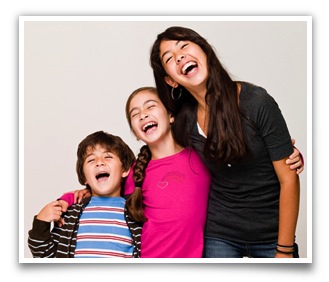Current Projects
The following are some of the current projects taking place in Hawai‘i or involving Native Hawaiian and Pacific Island children and families. Some are research projects while others are service projects and programs that we can all learn from. We know there are other programs out there that we might not be aware of. If you have a project or an on-going program related childhood obesity in Hawai‘i or the wellness of our keiki, please let us know.
Children's Healthy Living Project: For Remote Underserved Minority Populations in the Pacific Region
The Children’s Healthy Living Program for Remote Underserved Minority Populations in the Pacific Region (CHL) is a partnership among remote Pacific states and other jurisdictions of the US: Alaska, American Samoa, Commonwealth of the Northern Mariana Islands, Guam, Federated States of Micronesia, Hawaii, Republic of Palau, and the Republic of the Marshall Islands. All jurisdictions have US Land Grant Colleges, which have united in the Pacific Land Grant Alliance (PLGA).
The CHL is combining efforts to:
- train a public health nutrition work force
- conduct public health nutrition research
- develop a food, nutrition, and physical activity data management and evaluation system
- communicate nutrition and health related information to the public
With no US National Nutrition monitoring (e.g, NHANES) in these jurisdictions, not even in the states Alaska and Hawaii, the information we attain through CHL will guide future children’s obesity prevention programs and policies.
For more information, go to their website at: http://www.chl-pacific.org/
Click here to view their latest CHL Newsletter.
PILI ‘Aina Project: Partnerships to Overcome Obesity Disparities in Hawaii
Overweight/obesity has reached epidemic proportions in the U.S. and Hawai‘i, especially in Native Hawaiian and other Pacific Islander populations. This pilot study is a multi-disciplinary community-based participatory research (CBPR) project to test a culturally-relevant lifestyle intervention targeting overweight/obese Native Hawaiians (NHs) and other Pacific Islanders (PIs). The CBPR community-academic partnership for this project, called the PILI ‘Āina Project, is comprised of a JABSOM clinical department and 4 community organizations serving NHs/PIs.
The aim of this CBPR study is to pilot test whether a lifestyle intervention combined with home gardening (called PILI ‘Āina Program) is more effective in improving weight loss maintenance versus the same intervention delivered alone (called PILI ‘Ohana Program) in NHs/PIs. The PILI ‘Ohana Program has already demonstrated efficacy in helping NHs/PIs lose excessive weight and keep it off. The addition of home gardening of fruits/vegetables to this lifestyle intervention could enhance its effects by 1) increasing fruits/vegetable consumption and 2) improving sustained weight loss.
The two lifestyle interventions being tested in this study will be community-based and delivered by community peer educators. The use of a CBPR approach can 1) expedite the translation of empirically-supported obesity interventions and strategies into real world settings, 2) build the capacity of NH/PI communities in developing, testing, and delivering health interventions, and 3) build the research infrastructure of NH/PI communities needed for translational research and partnering with academic-based scientists. The findings from this pilot study will be used to seek further NIH funding to further test promising culturally-relevant, community-based obesity interventions targeting NHs/PIs.
Principal Investigator: J. Keawe‘aimoku Kaholokula, PhD, Dept. of Native Hawaiian Health, UH JABSOM
Collaborators: Claire Hughes, MD, Hawai‘i Maoli - Association of Hawaiian Civic Clubs; Bridget Kekauoha, Kula No Na Po‘e Hawai’i, Papakolea Hawaiian Homestead Community; Donna Palakiko, RN, MS Ke Ola Mamo Native Hawaiian Health Care System; Sheryl Yoshimura, MPH, RD Kokua Kalihi Valley Comprehensive Family Services
For more information visit: http://rmatrix.jabsom.hawaii.edu/index.jsp
Correlation of Genetic Risk Factors with Gestational Diabetes and Preeclampsia in Women from Hawaii
It has previously been established that pregnancy complication rates vary between ethnic groups. For example among Asian and Pacific Islander populations Preeclampsia is highest in Filipino women while gestational diabetes mellitus (GDM) is highest in Filipinas, followed by Chinese, Japanese and Native Hawaiian/Pacific Islanders. With the large population of Asian and Pacific Islanders in the State of Hawaii, both preeclampsia and gestational diabetes become the most common pregnancy complications. Furthermore, preeclampsia and GDM increase the risk of developing cardiovascular disease and type 2 diabetes, respectively in both the acute and remote postpartum periods. These findings are supported by the fact that the rate of cardiovascular disease and diabetes in the overall population are also increased in the State of Hawaii.
In this pilot study, we hope to identify genetic markers (single nucleotide polymorphisms) that can be used as predictors, or lead to further research to find the underlying cause, of these common pregnancy complications within predominant ethnic groups in Hawaii. These markers may also serve as links between the development of preeclampsia and GDM and the later development of cardiovascular disease and type 2 diabetes.
Principal Investigator: Johann Urschitz, PhD Dept. of Anatomy, Biochemistry & Physiology, UH JABSOM
Co-Principal Investigator: Janet Burlingame, MD, Dept. of Obstetrics & Gynecology, UH JABSOM
Collaborator: Thomas Slavin, MD, Dept. of Pediatrics, UH JABSOM
For more information visit: http://rmatrix.jabsom.hawaii.edu/index.jsp
Ho‘ala - fighting obesity in Hawai‘i County
New Project Involves 12 Big Island Schools
Hawai‘i is one of only eight locations in the U.S. to receive the “rapid response funding award” to launch a partnership between schools, the community and government to fight obesity in Hawai‘i County. The Robert Wood Johnson Foundation’s Active Living Research Program has provided nearly $150,00 to the Office of Public Health Studies to launch “HO‘ALA”. The word ho‘ala means “to waken”, but it also stands for Hawai‘i’s Opportunity for Active Living Advancement.
Coordinators are Dr. Katie Heinrich and Laura Dierenfield of Peoples Advocacy for Trails Hawai‘i. They are working with 12 public and private schools in Hawai‘i County to improve access to more active ways for children to get to and from class. “We want to make it easy, fun and safe to get daily exercise by walking or bicycling to school,” said Dierenfield. Added Heinrich, “We hope to impact childhood obesity and help reduce the nearly $300 million spent annually in Hawai‘i to treat obesity-related diseases.”
Helping communities in need is also a goal. Participating schools have at least 35% of their students eligible for free or reduced-cost lunch.
For more information, visit www.pathhawaii.org.
Hawaiʻi Health Matters
The Hawaiʻi Health Data Warehouse new companion data website.A one-stop resource for information about community health in Hawaiʻi, and healthy communities in general.
Pacific Kids DASH for Health (PacDASH)
Principal Investigator: Rachel Novotny
Pacific Kids DASH for Health (PacDASH) is a community-based intervention that links food, PA, and health, and targets overweight children in Hawai‘i with a goal of preventing further weight gain. Components of the intervention include a food and PA prescription delivered by physicians at community-based health centers complemented with a toolbox of activities, behaviorally tailored messages, and PacDASH educational materials.
Hawaii Youth Metabolic Study
Principal Investigator: May Okihiro, UH JABSOM Department of Native Hawaiian Health and the Department of Pediatrics
This study will characterize the development of metabolic syndrome (MetS) in a Native Hawaiian and Samoan children by determining the prevalence of MetS in a population of children at high risk for obesity, examining laboratory and physical markers associated with MetS and examine the association of factors in pregnancy and early childhood and the development of MetS.
Healthy Pacific Child Program and Health Foods Hawai‘i
Principal Investigator: Rachel Novotny
The objectives of the study are: 1) To design & test a dietary assessment instrument to be used to target & evaluate diets & nutrition related intervention programs for children in the Pacific (PacTrac) 2) To develop & test healthy foods intervention program centered on food stores & local food systems to improve production, preparation, sales & consumption of healthy foods by Pacific Island children and their families (Healthy Foods Hawai‘i)
Pacific Islands Families Study
Principal Investigators: Janis Paterson and Teuila Percival
The Pacific Islands Families Study is a long-running, cohort study of 1398 children (and their parents) of Pacific Islands origin born in Auckland, New Zealand in 2000.
The three overall objectives of the PIF Study are: 1) To provide information on Pacific peoples' health, and the cultural, economic, environmental and psychosocial factors that are associated with child health and development outcomes and family functioning, 2) To determine how such factors individually and interactively influence positive and negative child, parent and family outcomes over time 3) To provide information that will help set quantifiable targets for Pacific peoples' health.
The Pili ‘Ohana Project: Partnerships to Overcome Obesity Disparities in Hawai‘i
Principal Investigators: Keawe Kaholokula, UH JABSOM Department of Native Hawaiian Health
The PILI ‘Ohana program represents a partnership between 10 community-based organizations throughout the State of Hawai‘i and a team of academic researchers from the Department of Native Hawaiian Health (DNHH) at the University of Hawai‘i John A. Burns School Of Medicine. The aim of PILI ‘Ohana is to integrate community wisdom and expertise with scientific methods to conduct research on health disparities, with a specific emphasis on obesity, in Native Hawaiian and Pacific Peoples (including Filipinos, Chuukese, and other Pacific Islanders).
 Fun 5: A Physical Activity and Nutrition Program, Dissemination in Elementary Afterschool Plus (A+) Programs
Fun 5: A Physical Activity and Nutrition Program, Dissemination in Elementary Afterschool Plus (A+) Programs
Principal Investigator: Claudio Nigg
Fun 5, a physical activity and nutrition program for kids, is designed for elementary school kids at all skill levels and is easily incorporated into the Afterschool Plus (A+) program or in elementary school classes.
Fun 5: Encourages kids to exercise five days a week and eat five servings of fruits and vegetables every day, is designed to be fun to help kids form positive ideas about healthy lifestyle habits and is noncompetitive so that all participants can enjoy their success.
Hui Malama O Ke Kai
The Hui Mälama O Ke Kai program is a truly unique after-school youth development program serving primarily Native Hawaiian 5th and 6th graders attending Blanche Pope and Waimänalo Elementary schools. In addition, approximately twenty dedicated program alumni in grades 7-9 continue involvement through the newly piloted ‘Opio Leadership Program.
Programming takes place five days a week at no cost to participating families. The uniqueness of the program stems from its foundation in Native Hawaiian culture and values, the fact that it is based around an ocean and environmental theme, as well as its deep connection to the community of Waimanalo.

